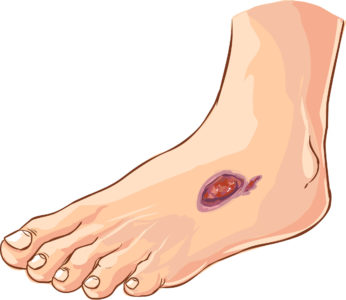 A recent evaluation of the landscape of diabetic foot ulcer care in America found that a person’s risk of death or leg amputation are greatly impacted by where they live and the color of their skin. According to the research out of the University of Wisconsin School of Medicine and Public Health, Black patients, particularly those living in rural areas, are at a heightened risk for losing their leg or dying as a result of complications related to their diabetic foot ulcer.
A recent evaluation of the landscape of diabetic foot ulcer care in America found that a person’s risk of death or leg amputation are greatly impacted by where they live and the color of their skin. According to the research out of the University of Wisconsin School of Medicine and Public Health, Black patients, particularly those living in rural areas, are at a heightened risk for losing their leg or dying as a result of complications related to their diabetic foot ulcer.
Diabetic Foot Ulcers
For the study, the team of researchers reviewed data on more than 124,000 patients with diabetic foot ulcers who were hospitalized in 2013 and 2014. They found that overall, the group had a 17.6% rate of major amputation or death. However, Black patients had a 21.9% rate of major amputation or death related to diabetic foot ulcers, a 4.3% disparity. Other findings from the study include:
- Those living in rural areas had a 0.7% increased risk of death or amputation.
- The amplified effect for Black people living in rural areas was not the sum of the two percentages (5%), but rather an increase of 10.4% in death or amputation risk.
“When you actually look, they have a more than 10% increased risk, doubling what we would have expected,’’ said Dr. Meghan Brennan, an infectious disease physician and lead author of the study. “They are undergoing major amputations at a rate that is much higher than it should be. Disparities happen in medicine and we need to recognize them before we can begin to address them.”
Although researchers stopped short of pinpointing exactly why the disparities exist, Brennan surmised that the results could be indicative of weak points in the ambulatory health and triage care systems, and the fact that vascular surgeons and wound salvage teams are not as plentiful in rural areas. No matter where you live, prevention and early intervention are key if you are diabetic and are at risk for foot ulcer formation.
We share a number of tips for caring for your diabetic feet on our blog and website, and we always talk with our diabetic patients about the importance of improved foot health as they manage the totality of their condition. A small sore may not seem like a big deal, but if diabetes complicates blood flow and the wound can’t heal, it can turn serious in a hurry.